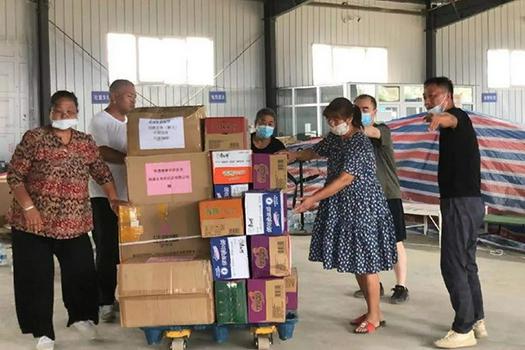The Amity Foundation launched its Disaster Relief Initiative in response to the recent flooding in Henan on July 21.
By 4 p.m. on August 2, the Christian-based charity had raised RMB 22.68 million (USD 3.4 million) for humanitarian aid in the afflicted areas. According to Xinhua News, a Chinese state media outlet, the catastrophic flood disaster had claimed 302 lives, while 50 people were still missing as of 12 p.m. on August 2.
The Amity Foundation Hebi Transfer Depot carried out successive dispatchment of relief supplies between 5 p.m. July 31 and 5 p.m. August 1. Shipped items included cooking oil, noodles, self-cooking noodles, rice, self-cooking rice, bottled water, disinfecting powders, 84 Disinfectant (a popular Chinese disinfectant brand), and water pumps. These supplies would benefit shelters in Liyuan Village, Liuzhuang, Xiwangdu Village in Jun County's Xiaohe Town, and Beijing Village in Qi County's Lingshan Town.
On August 2, another batch of supplies made its way to a heavily battered Shinaimiao Village in Xigang Town of Qixian County, Hebi City. Local villagers received 100 packs of noodles, 500 cartons of self-cooking rice, five cartons of cooking oil, and 75 packs of bottled water as replenishments, along with 20 containers of disinfectant, 20 cartons of disinfecting powders, 10 cartons of 84 Disinfectant and two sprayers to help villagers sanitize outdoor areas, which would help to reduce COVID risks.
From 10 p.m. July 30 to 10 p.m. July 31, additional equipment such as isolation gowns, gloves, masks and Clorox (a commercial bleaching agent) were dispatched from the organization's Transfer Depot to more than 160 villages in the Xinxiang City general area.
Since August 1, donations from more than ten NGOs and companies from Nantong had also arrived at Xinxiang, Henan. Donated supplies included food (rice, instant noodles, canned congee, etc.), daily necessities (quilts, blankets, clothing, etc.), as well as hygienic products (soap, disinfectants, etc.). The next day, supplies were promptly distributed to shelters located in severely affected villages and towns, where people's immediate needs could be met.












